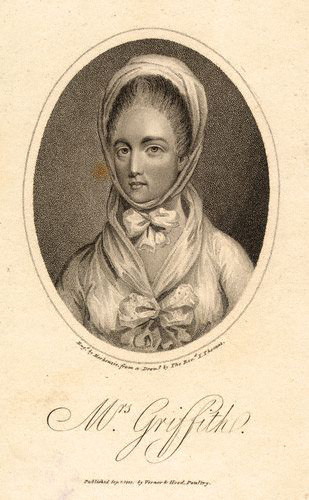Dr Johnson’s Reading Circle went back to our computers to read one of the plays in the Oxford Classics edition of Eighteenth-Century Women Dramatists. This time we entered into the unknown, reading The Times by Elizabeth Griffith.
Elizabeth Griffith was the daughter of the manager of the Smock Alley Theatre in Dublin. After a mediocre career as an actor, she caught the public’s attention by publishing the love letters between her and her fiancé. She channelled this attention through a full career of plays, translations and novels. The Times is inspired by the Venetian comedies of Goldoni, who tried to update commedia dell’arte into a comedy of manners.
Mr Woodley is facing serious financial ruin but can’t admit it to his wife, Lady Mary Woodley, who blithely carries on spending. This rapid spending of money is facilitated by Mr and Mrs Bromley, who not only encourage the couple in their extravagance but lend them credit. Seeing bankruptcy on the horizon, Woodley’s valet-de-chambre looks out for how much he can steal before there’s nothing left. There is one glimmer of hope for the couple: Woodley’s uncle, Sir William, who has the funds to relieve them but doesn’t approve of the marriage.
The first two acts primarily set up the themes and characters. It would seem like everyone is poor, or at least everyone is spending more money than they have. Mr Woodley tries to make it seem that his selling his racehorse is not due to poverty at all but because he is suddenly uninterested in horse-racing. He and his friend, Colonel Mountfort have fun pretending to be horse auctioneers, claiming that the horse is related to Alexander’s famous horse, Bucephalus.
Enter his wife. Unaware of the couple’s financial position, she’s looking forward to an auction because “one meets with so many fine things there one never thought one wanted before.” She’s not a complete spendthrift though, she won’t have her earrings adjusted for any more than a thousand pounds. These earrings pass through a few hands in the first two acts and it seems that those earrings may play a role in the story to come.
The last main character to introduced, the uncle, Sir William, is a ranting, hyperbolic man, calling one character “pert, coxcombical and lazy”, and castigating another servant as “Mr Slow-Boots”. At one point he harangues another character about why she doesn’t want to get close to him, presumably as he’s been throwing himself around throughout. He isn’t all bad, he has a sentimental streak for children and is known as a generous benefactor to those he feels worth his help, which unfortunately for Lady Mary and her husband, does not include them.
So far this play has been full of fun words and phrases, whether it’s a character afraid of being “sneered to death” or the use of John Gay’s phrase “cool as a cucumber”, there were a number of fun little linguistic titbits. Another favourite was Sir William’s use of ‘coxcombical’, a word meaning foolish and dandified; or ‘fubsy’, meaning short, stout and squat. One word which caused consternation was ‘cisibeo’, a sort-of ‘safe’ male who can accompany women to dances which we parsed as a non-gay gay-best friend.
It was interesting when we finished our reading and proceeded to talk about the play so far how each person was keen to justify the actions of the person they were playing. The person playing Mrs Woodley insisted she was more aware and thoughtful than she seemed, Woodley said that his wish to shield his wife show him to be kind, Sir William insisted that he was a generous and friendly person when not provoked - it showed how the writing had produced slightly deeper clothes than they first appeared.
It’ll be interesting to see how far the Bromleys will push the Woodleys, how deep in trouble the Woodleys are going to find themselves and if Sir William will ever be nudged out of his temper to help them. I look forward to the next instalment to find out more.



No comments:
Post a Comment